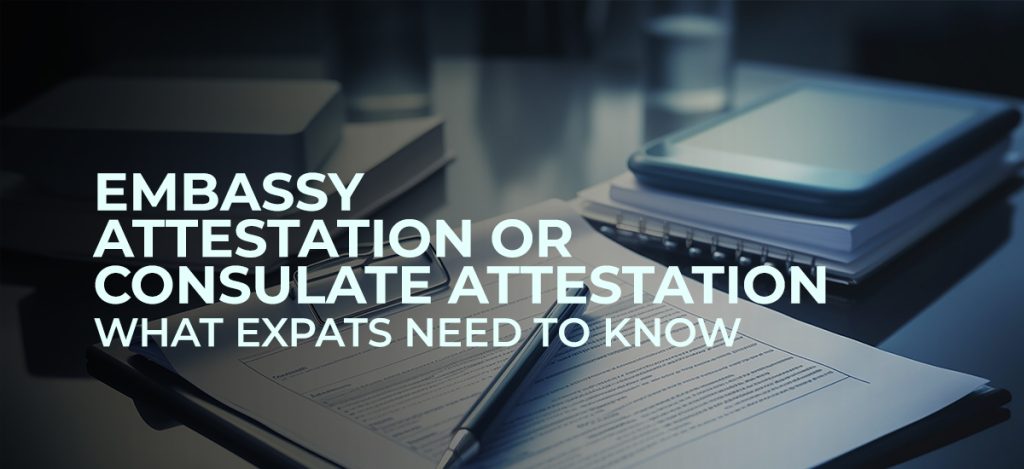For UK nationals planning to live, work, or do business abroad—particularly in countries across the Middle East, Africa, or Asia—document attestation is a critical step. Whether it’s for employment, higher education, company formation, or family relocation, foreign governments require official documents to be verified for authenticity and accuracy. This process is often referred to as attestation or legalization, and two commonly misunderstood terms in this context are Embassy Attestation and Consulate Attestation.
Understanding the distinction between the two and knowing when and where each applies can save UK expatriates time and money and avoid unnecessary rejections.
What is a Document Attestation?
Document attestation is a process of certifying documents issued in one country so that they are recognized as valid and authentic in another country. For UK-issued documents, this typically involves:
- Notarization (by a UK solicitor or notary public)
- Legalization by the UK Foreign, Commonwealth & Development Office (FCDO)
- Attestation by the consulate or embassy of the destination country
This final step—attestation by a foreign diplomatic mission—is where the confusion often arises.
Embassy Attestation vs Consulate Attestation: What’s the Difference?
Embassy Attestation
Embassy attestation refers to the process of having documents attested directly by the embassy of the destination country located in London (or another capital city). For example, if you’re moving to the UAE, your UK documents must be attested at the UAE Embassy in London.
The embassy is considered the central foreign diplomatic mission and handles a wide range of high-level tasks, including:
- Attestation of academic, personal, and commercial documents
- Issuance of visas and travel permissions
- Diplomatic relations and trade matters
Embassy attestation is mandatory for countries that do not accept apostille certification alone (non-Hague Convention countries). It often requires both Foreign, Commonwealth and Development Office (FCDO) legalization and translation before submission.
Consulate Attestation
Consulate attestation, on the other hand, refers to document verification carried out by a consulate office, which is typically a branch of the embassy located in a different city. In the UK, consulates can be found in cities such as Manchester, Birmingham, or Edinburgh.
Consulates often serve specific regions and handle:
- Local citizen services
- Emergency travel documentation
- Document attestation (in some instances)
However, not all consulates offer attestation services for every type of document. In many cases, the embassy in London retains the exclusive authority to carry out or finalize attestation.
Which One Do UK Expats Need?
The short answer: It depends on your destination country and the type of document.
For Middle East Destinations (e.g., UAE, Qatar, Kuwait):
- These countries require embassy attestation for personal, educational, and commercial documents.
- The process typically includes:
-
- Solicitor Notarization
- FCDO Attestation
- Embassy legalization in London
Even if there is a consulate closer to you, they may not offer attestation services or may redirect you to the London embassy.
For Hague Convention Countries:
- If the destination country has signed the Hague Apostille Convention, you may not require embassy or consular legalization.
- An apostille from the Foreign, Commonwealth and Development Office (FCDO) may suffice.
Commercial Documents for Trade or Investment:
- Some consulates may be authorized to attest to commercial documents, such as powers of attorney, memoranda of understanding (MOUs), or business contracts, for use abroad.
- However, it’s advisable to verify whether the relevant foreign authorities accept the embassy or consulate.
Why Is Attestation So Important?
Without the right attestation, your documents may be rejected by foreign employers, educational institutions, or government agencies. This could delay:
- Visa processing
- Job offers
- Business registration
- Admission to universities
Attestation serves as a chain of trust—verifying that your UK-issued document is genuine and has not been tampered with.
Common Documents That Require Embassy Attestation and Consular Attestation
UK expats typically need an attestation for the following documents:
- Educational Certificates (Degrees, Diplomas)
- Marriage Certificates
- Birth Certificates
- Police Clearance Certificates (ACRO/PCC)
- Power of Attorney
- Commercial Agreements
- Medical and Financial Records
Key Considerations:
- The attestation process can take time, so applying well in advance is essential.
- Fees associated with the attestation process can vary depending on the type of document and the country of origin.
- Ensure you have the necessary documents, including the original document, copies, and a cover letter, as required by the embassy or consulate.
- Always double-check the requirements and procedures of the embassy or consulate of the destination country for attestation.
How can the Helpline Group in the UK help?
Backed by a strong and experienced team, Helpline Group brings over 25 years of expertise in company formation, embassy attestation and consulate attestation and apostille services in the UK, providing clients with a seamless and hassle-free experience. With a global presence and a tailored approach, we ensure that your attestation services in the UK are handled with precision and professionalism, making us your reliable ally.
